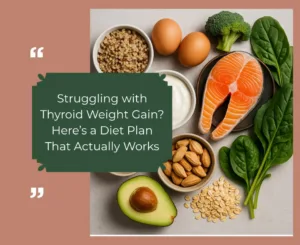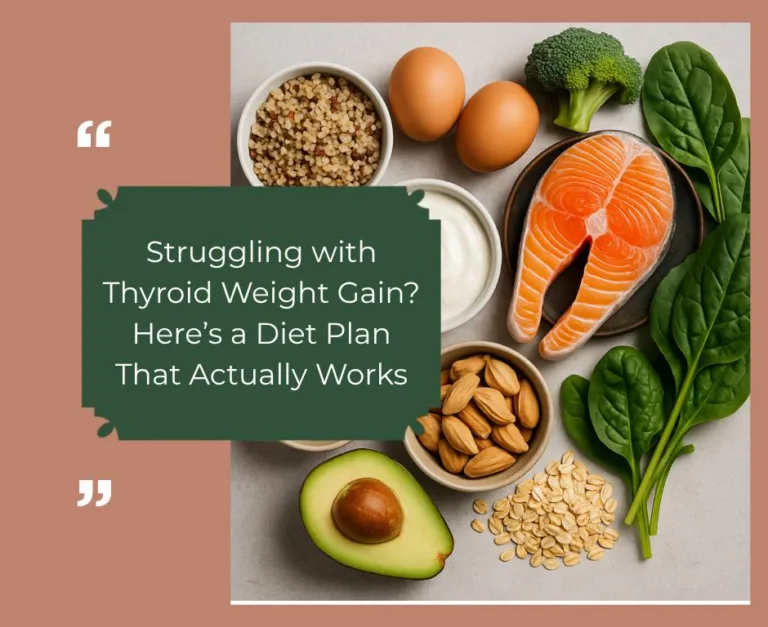Hypothyroidism is a condition that occurs when the thyroid gland does not produce enough hormones. An individual suffering from hypothyroidism may experience disturbed metabolic activity, reduced energy levels, fatigue, and problems with weight management among other symptoms.
However, one should not stress themselves out as hypothyroidism can be managed with medication and lifestyle changes like following a hypothyroidism diet. There are no magic foods but a well-balanced diet for thyroid can play a crucial role in your overall well-being.
Here’s a list of the top 10 diet tips one should follow while making and following a diet plan for the thyroid:
1. Consume Iodine-rich Food
Iodine is an essential nutrient when it comes to thyroid hormone production. Iodized salt and seafood like fish and seaweed are great sources. However, you should make a note of the quantity you consume. It is advised to eat iodine in moderation, too much of it can also interfere with the thyroid gland’s functioning.
2. Include Selenium In Your Diet
Selenium is known to protect the thyroid gland from oxidative damage and activate the thyroid hormones. Consider adding foods like Brazil nuts, eggs, and turkey to your daily meal plans. It is advised to visit a thyroid nutritionist in order to figure out the right portions of each nutrition required for you.
3. Increase Your Zinc Intake
Zinc is another micronutrient that can support thyroid function. Including zinc in the right amount can keep your hormone levels in balance. Some options to increase your zinc levels are lentils, chickpeas, pumpkin seeds, etc.
4. Add Omega-3 Fatty Acids
Omega-3 fatty foods are loaded with antioxidants and have anti-inflammatory properties. You can include omega-3 fatty acids in your diet by adding fish like mackerel, salmon, and sardines. For plant-based options you can consider seeds and nuts like flaxseeds, chia seeds, and walnuts.
5. Consume Goitrogens Mindfully
In easy terms, goitrogens are compounds that can interfere with thyroid hormone production. This is even more prominent in individuals with iodine deficiency. While you don’t need to completely eliminate them, you should be mindful of the portion sizes. It’s best to cook these foods, as cooking reduces the goitrogen content. This food group includes kale, broccoli, cabbage, cauliflower, etc.
6. Eat More Fibre
It is common for people to struggle with weight gain and slow digestion when dealing with hypothyroidism. Following a high-fiber diet can help in regulating these issues. Adding whole grains, fruits, and vegetables as staples should be part of your meal plan for thyroid management.
7. Limit Your Soy Intake
Soy has phytoestrogens that can impact your medications and hormone production. Soy-based products include tofu, edamame, soy milk, tempeh, and more. It is best to consult a thyroid dietitian and plan your diet accordingly.
8. Stay hydrated
Adequate hydration is essential in supporting your metabolism, digestion, hunger cues, and overall energy levels. Dehydration can cause fatigue and contribute to weight gain. Aim for at least 8-10 glasses of water a day to ensure you are well-hydrated.
9. Lean Proteins Are Your Best Friends
Proteins are essential for muscle gain, repair, and energy, all of which can be affected by hypothyroidism. Foods like legumes, tofu, paneer, turkey, and chicken breast are excellent additions to your hypothyroidism diet plan.
10. Plan Balanced Meals
Restrictions make it harder to follow a diet. It is important to have a diet you can follow. It keeps you motivated to continue and be on track. Hence, a good meal plan for thyroid should include essential nutrients without cutting out the food you like in a balanced way.
Conclusion
Managing hypothyroidism goes way beyond medication. It requires discipline and commitment. Exercising, a good sleep routine, staying active throughout the day, and many more such changes are needed. Take charge and don’t let hypothyroidism be in the way of anything. Small, consistent changes go a long way.
You can start your journey by getting a meal plan for thyroid today. Consult a registered hypothyroidism nutritionist by reaching us!

























